Course:ASIA321/2022/geyou葛优
Introduction
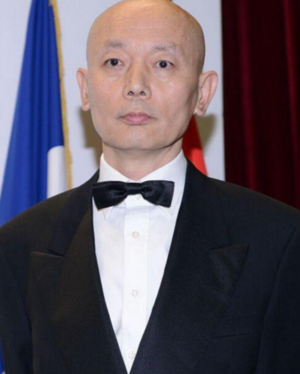
introduction: Ge You has extensive filmography covering cultural concepts from the 1980s to the modern day. Although he specializes in comedy, his roles frequently satirize the subtle intersections between truth, misfortune, and absurdism, and his most famous role, Xu Fugui in To Live, was a cultural phenomenon whose effect still persists today.
Biography
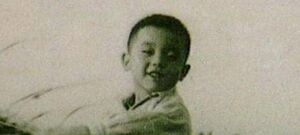
A brief biography: Ge You (Chinese: 葛优) was born on April 19, 1957, to a father who was an actor and a mother who was an editor in the Literature Department of the Beijing Film Studio. Since both of his parents were involved in the film industry, he was exposed to his future career field from a very young age. However, due to his introverted personality as a child, even his own parents did not expect his career choice.[1] His true debut began as a drama actor with the Art Troupe of the National Federation of Trade Unions, after failing to apply to other troupes for two years.
Life roles
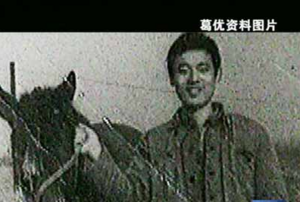
The celebrity’s life roles: At one point, Ge You travelled to Beijing to farm pigs, which is what provided him with the opportunity to join the Art Troupe. He never received a formal education in the performance arts or otherwise. Even after becoming an actor, he was only assigned to the roles of extras and side characters for a decade, but he persevered and eventually found massive success in his career. His father was initially skeptical of his prospects: for example, his father once saw a successful comedy sketch with one of Ge You’s peers and criticized Ge You, stating that the other actor had managed to succeed despite having little acting skill. Of course, Ge You eventually surpassed the majority of his peers.
When most other people in his troupe transferred elsewhere for better opportunities, he remained in the hopes of catching his big break, and his patience eventually paid off. One could say that his journey in life matches some of the everyman characters he plays in his films since many of them are also marked by their struggles through humble beginnings.
Screen roles
The celebrity’s screen roles:
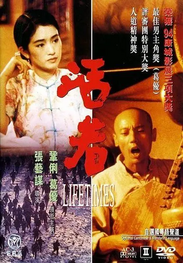
Ge You was involved in various different type of roles. Most of Ge You’s works were comedies, but one of his most famous works, To Live, was a drama, and he has also acted in some period dramas and other dramas. Generally, he is still mostly known for his comedic works, as well as the aforementioned To Live. In his comedic roles, his characters are typically individual with personality flaws but ultimately compassionate at heart. This means that, regardless of whether the work relies on slapstick humour or low comedy, the work can be used as a literary exploration of the human condition. He does not select his roles indiscriminately; he prefers to opt out of contracts or positions if he believes he is not suitable for the role. This leads to him generally finding success in every film he is involved in.
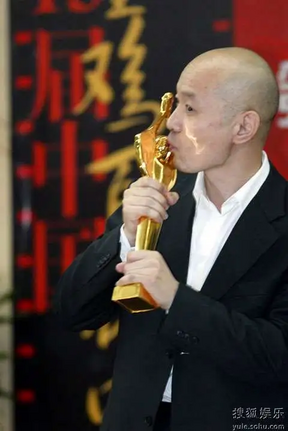
Substantive analysis of the celebrity's profession
A critical analysis of one or two films starring the celebrity under analysis: To Live
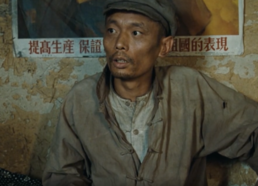
In the drama film To Live, directed by Zhang Yimou, Ge You played the protagonist, Xu Fugui. Fugui suffers various misfortunes throughout the narrative.
His family leaves after he loses all his property from his bad habit of gambling, then he is captured by the People’s Liberation Army of the Chinese Communist Party while serving for Kuomintang forces. Both of his children die: his son is killed in a car accident; later, during the tumult of the Cultural Revolution, his daughter dies due to receiving insufficient medical care during childbirth. Despite all of this, Fugui does not give into despair, believing that “life will get better and better”. Fugui’s optimism borders on absurdism, as common sense would likely be unable to take such a view in the face of such extended and excessive tragedy. Despite the darker tone of this film, the irony in his belief itself is comparable to the irony displayed in some of Ge You’s other roles.[3]
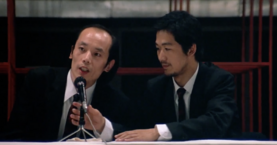
The Troubleshooters
In the comedy film The Troubleshooters, directed by Mi Jiashan, Ge You plays Yang Zhong, one of the three protagonists responsible for the “troubleshooting” company. Ge You’s somewhat flippant and disorganized appearance is contrasted with the character’s sagacious, genuine character. Yang Zhong’s character archetype holds an interesting position within the ironic deconstruction of contemporary Chinese society at the time of production. In a physical sense, he does not exactly fit the societal standard of normalcy and could be looked down on by others; in a mental sense, his habit of speaking about philosophy and psychology would make him the target of suspicion and distrust. These juxtapositions in his character serve the dual purpose of endearing him to the audience and allowing the audience to view parts of society that are commonly taken for granted from a new perspective.[4]
The celebrity’s contribution to their professional field (cinema, film culture, and beyond): He is considered one of the most iconic Chinese actors of the 1990s and beyond, and is internationally known: he was the first Asian actor to win the Best Actor award at Cannes for his role in To Alive, and Ge You has also received the Best Actor award at the Hundred Flowers Awards three times. Meanwhile, Ge You had received the Golden Rooster Award for Best Actor for his role in "The Great Satyr" As of today, he is one of the most iconic and recognized Chinese actors, due to his appearance and his career. Pioneering a new era in the film industry .
Key societal, economic, political, moral, and historical forces that influenced the celebrity’s career: Ge You has expressed disinterest in expanding his influence overseas, stating something along the lines of “If I can satisfy the audiences in my own country, that’s good enough.”[2] However, To Live was not permitted a theatrical release in China due to the critical view of the Chinese government, even though it remains popular among civilians. A few of his other films have similarly been restricted or partially censored by the government, though To Live remains the most popular. In a sense, he certainly did succeed at satisfying the audiences of the country, even holding it in higher priority than the government.
Generally, he keeps a low profile, and there is not much information available on his personal life and beliefs. As a celebrity, he is more defined by how the audience perceives his work than an independent public persona. In a way, he has not strayed too much from his reserved and introverted childhood self, other than the difference of being able to express the force of his personality vicariously through his characters. As mentioned above, his characters are typically the ones to offer new insights into a view or situation, making them ideal for deconstructive works.
Reception of the celebrity
Reception of the celebrity: The reception of Ge You is very positive, he is regarded as one of the most prominent actors in China due to how easy it is to recognize him. Ge You is typically famous for his comedic depictions of characters, he tends to be someone who is humble in terms of appearance. Ge You represents the image that a common person with normal looks can be an actor, and he is noted to always sign autographs for fans.[2]
He has won a number of awards throughout the years, starting from 1992 being his first award, and he continued to receive awards throughout the years until 2014. In 1989, he was able to star alongside Zhang Guoli and Liang Tian in a comedy film and won the 9th China Film Golden Rooster award for Best Actor nomination for the film.[3] The allowed him to be recognized in the film industry, as he began acting more. Ge You was well-received in the past, appearing in film every year or two. He has also participated in a number of philanthropic activities such as charities and donated to a number of different charities during times of disaster.
However, Ge You has come under some controversies in the past. Ge You in 2004 endorsed the Yilin Wood Industry, which was found to be illegal by the Beijing police in 2007.[4] People began to doubt his credibility after they found out that Yilin took money from the public to sell forests illegally. However, Ge You had refunded all his advertising revenue from Yilin to the Beijing police. In 2014, there were rumors going around that a Chinese actor had lost a significant amount of money while gambling in Macau. Pictures showed that Ge You was there gambling, and people began to speculate it was him. However, Ge You never confirmed that it was him in Macau and there was no evidence against him. Ge You had also sued a number of individuals and companies for using his image without permission. It seems there is not much controversy surrounding Ge You.
The audience that would most enjoy Ge You would likely be the people that enjoy watching the normal events of life unfold. This is because Ge You represents the unintriguing normal person, who is just attempting to get through life like everyone else. However, there may also be a portion of the audience that think Ge You is too ugly and should not receive screen time. He certainly is an outlier in comparison to the other actors that tend to be more handsome. Ge You’s scandals were not that serious, and I think him refunding the endorsement fees shows that he sincerely regretted his action. However, some people may believe that he should have been better informed as some may look up to him as a role model.
Critical literature review
A critical literature review: According to 段广超, Ge You remains popular in the current film industry because his latest films portray the common people attempting to navigate through life.[5] Ge You is able to play a variety of characters, such as the regular person and even villains. Ge You remains humorous regardless of the role that he is performing. The author argues that due to this flexibility of Ge You, who is able to perfectly mimic real life, has led to his critical acclaim. Ge You’s humor is something that the author examines extensively for his unique depiction of characters in his films.
Ge You also became the face of advertisement, representing a new kind of advertisement strategy for the large companies. Rather than focus on traditional methods of creating ads, the companies would hire Ge You to create something that was memorable and humorous in order to for the clients to remember their products.[6] Ge You’s humorous strategy of “eating grass” was effective and allowed the Grass Coral company to excel in advertising its drug products. Consumers remembered the ad fondly and Ge You was revolutionized the way that advertisement was done, putting a fresh spin on a traditionally difficult advertisement.
In other research, Ge Yao’s iconic picture of him striking a lazy pose has cultivated sentiments of the lying down movement. Youths these days are facing record high mental health issues and a sense of hopelessness for the world. Much like how Ge Yao’s pose takes a nonchalant view of the world, the youth’s internet culture has also created the idea of personifying such a pose in real life.[7] Further research needs to be done on the youth of China and why they would feel that way about their lives, which is explored in the article.
This article examines the experience of Ge You from his various roles, it aims to answer the question of whether he remains as good of an actor as before. It appears that he is still loved by the community due to this passion for entertaining others.[8] Despite being 60, Ge You is still able to get roles in cinema, suggesting that the never truly departed from the industry despite his age. Ge You's difficulty in becoming an actor is highlighted by the author to be one that was full of struggles, leading to his eventual success in the industry. To many, he is considered irreplaceable given how many films he was in. He is easily recognized and beloved by the people of China due to his tenure in the industry.
Critical debates
Critical debates: From the literature review, it would appear that Ge You is someone who is beloved due to just how long he has been in the industry. Most the literature review conducted reveals that Ge You is a beloved actor with minimal criticism. All the authors have identified him as a pioneer and respected actor in the field of humor. His uncanny ability to a variety of characters is also praised. His influence on the industry can be observed in how he is still able to land roles even in 2016, suggesting that he was not forgotten with age. Ge You represents the underdog, the everyday person who was able to succeed due to his hard work at perfecting his craft. In this way, his audience and fans can look up to him as a role model that excels in entertaining them. Psychologically, if there was an actor that has been prominent for decades, they would not be forgotten due to how long they have entertained their audiences. There is minimal debate on the topic because the research literature tends to be limited. However, one problem was revealed by the literature review, where Ge You’s depiction has become a meme which the youth have heavily identified with. This has resulted in the lying flat movement where the youth are giving up on life.
Conclusion
Conclusion: In sum, those who are interested in learning about Ge You can consult this resource to understand how an unlikely actor found success. Ge You was able to contribute to the genre of comedy and humor through the unique depiction of his characters. Those who are interested in learning about the development of a comedy actor can look to Ge You’s example of how he became successful. He was able to carve a niche within a large industry to solidify himself as someone worth watching. Despite some controversies which he promptly addressed, Ge You remains a dedicated actor for decades. For further research, it may be interesting to examine how Ge You is received by the younger film audiences, who may not be so familiar with his characters.
References
- ↑ yi, xiao (may 26th 2014). "揭秘儿时葛优:性格腼腆胆小 打架就开溜". people.cn. Check date values in:
|date=(help) - ↑ "葛优". 维基百科.
- ↑ "葛优". 维基百科.
- ↑ "葛优". 维基百科.
- ↑ "葛优系列银幕形象的风格特征研究". CNKI.
- ↑ "葛优为什么会"吃草"". 商业案例频道.
- ↑ "从"废柴"到"葛优躺" :社会心理学视野下的网络青年"丧文化"研究". Baidu. 2017.
- ↑ "又见葛优,他还是当年的葛大爷吗?". 2016.
Sharing
| This resource was created by Course:ASIA321. |
